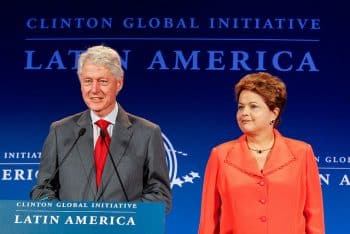Brazil’s Dilma Rousseff: Not a Coup but Payback for Systemic Corruption
=By= Dady Chery and Gilbert Mercier

Protests in Brazil. Photo by Jordi Bernabeu 
Chery and Mercier offer an insightful analysis of the expulsion of Dilma Rousseff from the presidency. As they note, one must surely ask who is doing what to whom, and towards what end? It seems highly likely that this is yet another game within a game aimed at weakening Russia and China by undermining the BRICS agreement. It is at least component deserving serious consideration, as Brazil is an important partner in BRICS.
The authors also point to the ongoing exploitation and suppression of the poor and labor. This includes what amounts to slavery for Haitians in Brazil. Rougly 75, mostly male, Haitian a day arrive in Brazil and enter a highly exploited labor class. The fact that his has proliferated under the Workers Party is damning evidence that the leadership is anything but pro-workers. – rw
In a public open vote, Brazil’s lower house voted overwhelmingly on April 17, 2016 to impeach President Dilma Rousseff. The tally of 367 for impeachment, as opposed to 137 against and 7 abstentions, far exceeded the two-thirds majority that was required. Rousseff says it’s a coup; the mainstream media say it’s a coup; and the alternative press, from the pro-Russian anti-imperialist left to the neoliberal fake left, says it’s a coup. This absurd consensus alone should tell everyone that it is not a coup. To say that the political crisis in Brazil is a soft coup d’état, organized by the United States, is at best a simplification of the situation and at worst a poor representation of reality. After 14 years of Partido dos Trabalhadores (PT, or Workers’ Party), the Brazilian public has grown profoundly disappointed with a government that has failed, not only to keep its promise to clean up Brazil’s systemic corruption but also to avoid becoming tainted by this corruption. Inequality, social injustice, and racism are practically unchanged. Rousseff was elected with the expectation that the criminals of Brazil’s military dictatorship would be brought to justice, but instead of pursuing them, she promoted what she called a “national reconciliation.” Under both Dilma Rousseff and her predecessor Luiz Inacio Lula da Silva, Brazil grew its police and military to unprecedented levels in peacetime and became an active handmaiden to US imperialism in the occupation of countries like Haiti. It took Lula and Dilma’s fake socialism to invade Haiti, not Brazil’s military dictatorship.

Protestors in Sao Paulo March 2015.- Agencia Brasil.
Ms. Rousseff’s legal troubles should rather be viewed as a sign that Brazil’s justice system is sufficiently well to take down the country’s top bankers, industrialists, and elected officials. This is a distinction that few countries can claim: certainly not the US where corrupt bankers were given a bailout after crashing the economy, and definitely not France where former President Nicolas Sarkozy was not impeached despite various accusations during his tenure. In fact, Sarkozy is making a political comeback despite five open legal cases of alleged corruption against him. Rousseff’s desperate attempts to fight the impeachment have only aggravated her situation. The lower house vote followed a clumsy and unsuccessful bid to grant temporary immunity to Lula after his arrest by appointing him to a cabinet post. Rousseff will likely lose the next impeachment vote in the senate, which requires only a simple majority. More and more senators are turning away from her, especially since her New York trip on April 22, 2016, during which she appealed to the United Nations to intervene on her behalf, in a move that was widely seen as an insult to Brazil’s national sovereignty.
Rousseff argues that unlike her political colleagues who have been ensnared in the Petrobras scandal (also called operação lava jato, or operation carwash), she did not launder money, embezzle public funds, or hide her wealth in offshore bank accounts. She is formally accused of using public funds from state banks to cover up her government’s large budget deficit in 2014 while she was up for reelection. In Brazil, the use of such funds to cover government deficits was previously legal but is no longer so. The connection to her reelection is damning when one realizes that nearly all the cases of corruption uncovered in her party have involved kickbacks to finance her campaign, which succeeded by only three percentage points over the opposition and would have certainly failed without those large infusions of cash.
The left’s main argument in support of its soft coup theory is to say that the US is instigating an attack on BRICS; but a new Brazilian government will probably not withdraw from BRICS, for the simple reason that, in this alliance, Brazil’s trade of minerals and agricultural goods is substantive and essential to its economy. In the unlikely event that it should pull out, the impact on BRICS will be limited. From an economic, strategic, and military standpoint, the core of the alliance consists of Russia and China. In terms of geopolitics, Iran, which is not formally in BRICS, is also a key strategic ally that could counterbalance any potential defection from Brazil. Geopolitical considerations aside, most ordinary Brazilians are unaware of BRICS. Instead, they are reminded daily of the government’s corruption by the high taxes they pay and the interrupted public projects that should have benefited from the funds that were embezzled, and for which entire neighborhoods were displaced. The most startling among these projects include unfinished public transportation works, airport terminals, aquariums, and apartment buildings: empty shells that stand as visual testaments to Brazil’s endemic corruption.

Bill Clinton and Rousseff in 2013. (Blog do Planalto
There is no reason why the US should want to get rid of Dilma Rousseff and Lula da Silva, both of whom have been paragons of humanitarian imperialism. After a US-orchestrated coup against democratically elected Haitian President Jean-Bertrand Aristide in February 2004, Bill and Hillary Clinton arranged with Lula’s Minister of Foreign Affairs, Celso Amorim, to occupy Haiti with Brazilian troops, using the UN peacekeepers as a convenient cover. This was an unprecedented move against a country that was not at war. As a carrot, Brazil was vaguely promised a possible seat on the UN Security Council. For more than a decade, Brazil trained its troops and tested its military technology in Haiti, and for nearly all this time Brazil commanded the occupying troops of an expanded UN mission in Haiti (MINUSTAH). Brazilian generals justified the occupation by the fact that Haiti was not a dangerous assignment. By the time Celso Amorim became Rousseff’s Minister of Defense in 2011, there had been numerous calls by Haitians for the withdrawal of the UN occupation and many examples of rapes, killings, and other abuses by MINUSTAH troops. Nevertheless Amorim did not withdraw Brazil from the UN mission. More recently, Amorim reappeared as the Head of the Organization of American States’ (OAS) contingent that oversaw Haiti’s fraudulent elections of August 9 and October 25, 2015 on behalf of the US.

Hillary Clinton at Rousseff’s inauguration in 2011. – reflecting both her own and the U.S. approval. Agencia Brasil.
One of the most repulsive and hypocritical aspects of Roussef’s presidency has been the traffic of Haitians to Brazil, since the 2010 earthquake, to serve as slave labor for corrupt construction companies that supported her election campaigns and are shunned by Brazilian workers. The traffic continues at the rate of 75 Haitians per day. Many Haitians have died unnoticed while building stadiums for the World Cup and working on unpopular hydroelectric and mining projects that have deforested the Amazon. In one fell swoop, Dilma’s administration trampled the rights of the indigenous, degraded the environment of Brazil, and assisted the US goal to depopulate Haiti of its potentially troublesome young educated males.
In Brazil, as in France and most countries worldwide, citizens are fed up with their corrupt political class. Brazil suffers from a deep social malaise. The rich and even the middle class live in fortresses guarded by private security. Meanwhile the poor, who are mainly blacks and mulattoes, are reduced to the misery of the favelas. Lula has been celebrated by the poor and some of the left for the bolsa familia: a social program that subsidizes education by allocating funds to impoverished parents for every child in school. It is by this gimmick that the Workers’ Party won the poor people’s vote. In a blatant contradiction, however, Lula and Dilma have treated the favelas like occupied territories where Brazil wages war on its own poor. The massive militarized police that are “pacifying” the favelas received their training and desensitization in places like Port-au-Prince’s slum Cite Soleil. The problem with Dilma Rousseff, who is often presented as a leftist firebrand, and her political party, which carries essentially a communist name, is that, just like the pseudo-socialist Francois Hollande in France, she represents a fake left that serves the interests of the super-rich and is thoroughly corrupt.
There is no coup against Rousseff. Most Brazilians have simply become wise to her act and want her to go. On May 11, the Brazilian Senate will probably ask her to step down and stand trial by a committee of senators headed by the chief Supreme Court justice; and by January 2016, she and the rest of her clan will likely be permanently removed from office. This will prevent Lula from seeking the presidency, which he could do again, or promoting a candidate like Celso Amorim. Let Dilma and all the rest cry “coup!” Justice will pursue its course. Dilma should never have been reelected, and her impeachment might well be an early step toward a more representative democracy in Brazil. Perhaps the favelas will advance the job by rising up in a samba of Brazilian noite em nossos pés (nuit debout).
Update: May 12, 2016. In a vote of 55 to 22, Dilma Rousseff was impeached by the Brazilian Senate and suspended from her post.
Source: News Junkie Post

Gilbert Mercier is a French journalist, photojournalist and filmmaker based in the US since 1983. He is the co-founder & editor in chief of News Junkie Post.
Note to Commenters
Due to severe hacking attacks in the recent past that brought our site down for up to 11 days with considerable loss of circulation, we exercise extreme caution in the comments we publish, as the comment box has been one of the main arteries to inject malicious code. Because of that comments may not appear immediately, but rest assured that if you are a legitimate commenter your opinion will be published within 24 hours. If your comment fails to appear, and you wish to reach us directly, send us a mail at: editor@greanvillepost.com
We apologize for this inconvenience.
 Nauseated by the
Nauseated by the
vile corporate media?
Had enough of their lies, escapism,
omissions and relentless manipulation?
Send a donation to
The Greanville Post–or
But be sure to support YOUR media.
If you don’t, who will?
Photo by Lenny Wood 

